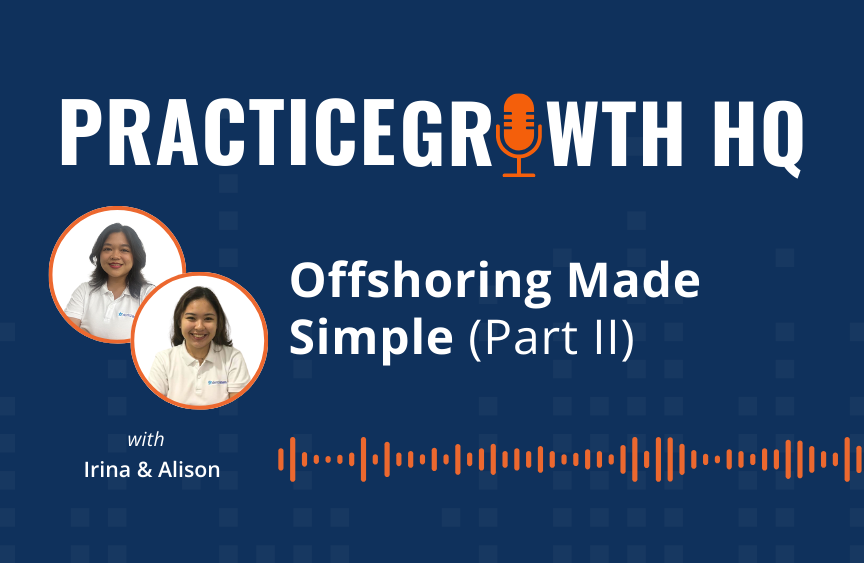I’ve seen the impact of offshoring up close in the Philippines, and it’s a total game-changer for healthcare practices. These days, industries from real estate to law firms—and even tradies—are using offshoring to streamline their work. In this episode of Practice Growth HQ, I chat with Alison and Irina about how offshoring, especially with teams like Dental Stars, is helping dental practices run smoother and focus more on patient care.
Leveraging Offshoring for Dental Practices:
1. Expanding Support Tasks:
Offshoring allows dental practices to efficiently delegate smaller but vital tasks. Irina, an experienced Dental Star, shares how she handles reception duties that might otherwise overwhelm in-house staff. By assigning tasks like managing calls, recalls, and reactivations to offshored team members, on-site staff can focus on more complex responsibilities that demand in-person interaction.
2. Enhanced Marketing Efforts:
Modern dental practices require robust marketing strategies to grow. Irina illustrates how practices can thrive with targeted social media efforts, driving new patient referrals through platforms like Instagram and Facebook. Offshored staff can also aid in composing engaging newsletters, tailoring content to reflect the practice’s unique brand voice and audience.
3. Training and Flexibility:
The Dental Stars benefit from the training provided by their Australian clients and access to Skill Builder resources. This ensures that they can quickly acclimatise to the required tasks, be it handling practice management systems like Dental for Windows or Dentally or creating compelling marketing content.
4. Cultural Integration:
Concerns about accents or cultural differences often arise when considering offshoring. However, as Irina and Allison share, the multicultural fabric of countries like Australia ensures that diverse backgrounds are embraced rather than being a hindrance. An ability to blend seamlessly into the ‘melting pot’ that is Australia allows Dental Stars to deliver consistent support.
5. Building Productivity and Relations:
Effective communication via tools like WhatsApp and email ensures that offshored team members like Allison are not just working for their Australian counterparts but with them. This cooperation fosters a productive environment where tasks are streamlined and support extends beyond borders.
6. Low-Maintenance, High Initiative:
There’s often a perception that offshore employees require significant time investment and training. However, the integration of training resources and initiative-driven individuals means they can swiftly adapt and add value with minimum ongoing input from the practice.
Embracing this Modern Approach:
Offshoring healthcare tasks, particularly in the dental sector, is not just a cost-cutting measure but a strategic move to optimise operations. By partnering with teams like Dental Stars, practices can ensure that every aspect of their business, from reception duties to innovative marketing techniques, is handled efficiently. It’s about practising hard to play easy, shifting burdens, and enhancing productivity to let your core team focus on operational growth and patient care.
If enhancing your practice’s growth while easing operational burdens could make a world of difference, why not explore the potential of offshoring?
For more insights and discussions on practice growth, tune in to the Practice Growth HQ podcast on
Spotify: https://spoti.fi/42rpDPf or Apple Podcasts: https://apple.co/3EoZbKI

